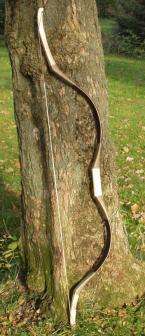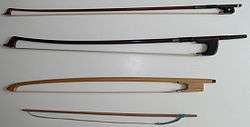bow
English
Etymology 1
From Middle English bowe, boȝe, from Old English boga, from Proto-Germanic *bugô. Cognate with West Frisian boge, Dutch boog, German Bogen, Danish bue, Norwegian boge, bue, Swedish båge.
Pronunciation
- (Received Pronunciation) enPR: bō, IPA(key): /bəʊ/
- (US) enPR: bō, IPA(key): /boʊ/
Audio (UK) (file) Audio (US) (file) - Rhymes: -əʊ
- Homophone: beau
Noun


bow (plural bows)
- A weapon made of a curved piece of wood or other flexible material whose ends are connected by a string, used for shooting arrows.
- A curved bend in a rod or planar surface, or in a linear formation such as a river (see oxbow).
- A rod with horsehair (or an artificial substitute) stretched between the ends, used for playing various stringed musical instruments.
- A stringed instrument (chordophone), consisting of a stick with a single taut cord stretched between the ends, most often played by plucking.
- A type of knot with two loops, used to tie together two cords such as shoelaces or apron strings, and frequently used as decoration, such as in gift-wrapping.
- Anything bent or curved, such as a rainbow.
- (Can we date this quote?) Bible, Genesis ix. 13
- I do set my bow in the cloud.
- (Can we date this quote?) Bible, Genesis ix. 13
- The U-shaped piece which goes around the neck of an ox and fastens it to the yoke.
- Any instrument consisting of an elastic rod, with ends connected by a string, employed for giving reciprocating motion to a drill, or for preparing and arranging hair, fur, etc., used by hatters.
- (nautical) A crude sort of quadrant formerly used for taking the sun's altitude at sea.
- (saddlery) Two pieces of wood which form the arched forward part of a saddletree.
- The part of a key that is not inserted into the lock and that is used to turn the key.
Synonyms
- (bow-shaped bend): arc, bend, curve
- (tool for playing stringed instruments): fiddlestick
- (a type of stringed instrument): musical bow
Derived terms
Translations
|
|
|
|
|
|
|
|
Verb
bow (third-person singular simple present bows, present participle bowing, simple past and past participle bowed)
- To play music on (a stringed instrument) using a bow.
- The musician bowed his violin expertly.
- (intransitive) To become bent or curved.
- The shelf bowed under the weight of the books.
- 1611, The Holy Bible, […] (King James Version), imprinted at London: By Robert Barker, […], OCLC 964384981, Psalms 62:3:
- How long wil ye imagine mischiefe against a man? ye shall be slaine all of you: as a bowing wall shall ye be, and as a tottering fence.
- (transitive) To make something bend or curve.
- (Can we date this quote?) John Milton
- We bow things the contrary way, to make them come to their natural straightness.
- (Can we date this quote?) Prescott
- The whole nation bowed their necks to the worst kind of tyranny.
- (Can we date this quote?) John Milton
- (transitive, figuratively) To exercise powerful or controlling influence over; to bend, figuratively; to turn; to incline.
- (Can we date this quote?) Francis Bacon
- Adversities do more bow men's minds to religion.
- (Can we date this quote?) Fuller
- not to bow and bias their opinions
- (Can we date this quote?) Francis Bacon
- (intransitive) To premiere.
- Cronenberg’s "Cosmopolis" bows in Cannes this week.
Derived terms
Translations
|
|
|
|
Etymology 2
From Middle English bowen, buwen, buȝen, from Old English būgan, from Proto-Germanic *beuganą, from Proto-Indo-European *bʰūgʰ- (“to bend”). Cognate with Dutch buigen, German biegen, Danish bue.
Pronunciation
- enPR: bou, IPA(key): /baʊ/
Audio (UK) (file) Audio (US) (file) - Rhymes: -aʊ
- Homophone: bough
Verb
bow (third-person singular simple present bows, present participle bowing, simple past and past participle bowed)
- (intransitive) To bend oneself as a gesture of respect or deference.
- 1900, L. Frank Baum, The Wonderful Wizard of Oz
- The soldier now blew upon a green whistle, and at once a young girl, dressed in a pretty green silk gown, entered the room. She had lovely green hair and green eyes, and she bowed low before Dorothy as she said, "Follow me and I will show you your room."
- 1913, Joseph C. Lincoln, chapter 4, in Mr. Pratt's Patients:
- I told him about everything I could think of; and what I couldn't think of he did. He asked about six questions during my yarn, but every question had a point to it. At the end he bowed and thanked me once more. As a thanker he was main-truck high; I never see anybody so polite.
- That singer always bows towards her audience for some reason.
- 1900, L. Frank Baum, The Wonderful Wizard of Oz
- (transitive and intransitive) To debut.
- 2010 (publication date), Kara Krekeler, "Rebuilding the opera house", West End Word, volume 39, number 26, December 22, 2010 – January 11, 2011, page 1:
- SCP recently announced that How the Grinch Stole Christmas! The Musical will bow on the newly renovated stage next December.
- 2010 (publication date), Kara Krekeler, "Rebuilding the opera house", West End Word, volume 39, number 26, December 22, 2010 – January 11, 2011, page 1:
- (intransitive) To defer (to something).
- I bow to your better judgement in the matter.
- (transitive) To give a direction, indication, or command to by bowing.
- 1934, Agatha Christie, chapter 7, in Murder on the Orient Express, London: HarperCollins, published 2017, page 124:
- Poirot rose gallantly, bowed her into the seat opposite him.
-
Derived terms
Translations
|
|
- The translations below need to be checked and inserted above into the appropriate translation tables, removing any numbers. Numbers do not necessarily match those in definitions. See instructions at Wiktionary:Entry layout#Translations.
|
|
Noun
bow (plural bows)
Translations
|
|
Etymology 3
From Middle Dutch boech or Old Norse bógr, both from Proto-Germanic *bōguz, from Proto-Indo-European *bʰeh₂ǵʰus (“arm”). Doublet of bough.
Pronunciation
- enPR: bou, IPA(key): /baʊ/
Audio (US) (file) - Rhymes: -aʊ
- Homophone: bough
Noun
.png)
bow (plural bows)
- (nautical) The front of a boat or ship.
- 1907, Harold Bindloss, chapter 6, in The Dust of Conflict:
- The night was considerably clearer than anybody on board her desired when the schooner Ventura headed for the land. It rose in places, black and sharp against the velvety indigo, over her dipping bow, though most of the low littoral was wrapped in obscurity.
-
- (rowing) The rower that sits in the seat closest to the bow of the boat.
Synonyms
- (of a ship): prow
Derived terms
- bow shock
- bow rudder
Usage notes
Translations
|
|
Etymology 4
Noun
bow (plural bows)
- (obsolete) Alternative spelling of bough
- 1610–1611, William Shakespeare, “The Tempest”, in Mr. William Shakespeares Comedies, Histories, & Tragedies: Published According to the True Originall Copies (First Folio), London: Printed by Isaac Iaggard, and Ed[ward] Blount, published 1623, OCLC 606515358, [Act V, scene i], page 17:
-
See also
- coll'arco
- curtsy
- kowtow
- Wikipedia article on bows (weapons)
- Wikipedia article on bows used to play string instruments
- Wikipedia article on bows (the knots)
- Wikipedia article on musical bows
- Wikipedia article on bows, the gestures of respect
- Wikipedia article on the bows of ships
